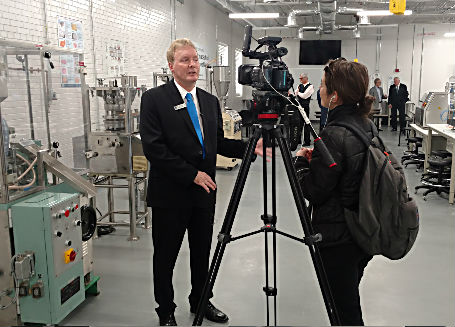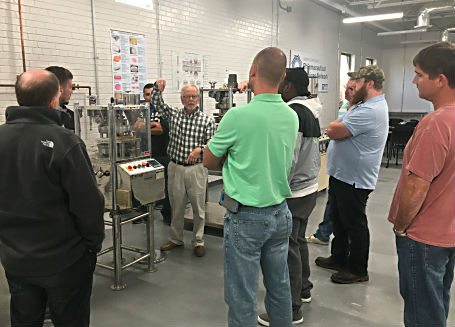The North Carolina Pharmaceutical Services Network has begun training at both Pitt Community College and East Carolina University. Its mission is
to prepare current and newly hired workers in all aspects of manufacturing oral solid dose pharmaceuticals – industry parlance for pills and tablets.
The Network is “already making its mark,” said Wanda Edwards Yuhas, executive director of the Pitt County Development Commission, a government agency that recruits and supports industry in the county. “It’s making a difference.”
Yuhas and other principals in the Network’s creation celebrated the official opening of the Network during a ceremony at Greenville’s Technology Enterprise Center, a former textile plant. Part of the Center has been transformed into a training facility for Pitt Community College that simulates a pharmaceutical-manufacturing environment with state-of-the-art equipment.
“We’re standing in an old prep shirt factory where now we’re training workers in the 21st century to make complex molecules,” said Mark Phillips, the North Carolina Biotechnology Center’s vice president of statewide operations and executive director of the Eastern Region Office. Phillips was instrumental in bringing together the partners that formed the Network.
Supporting economic development
The Network’s training is intended to benefit pharmaceutical-manufacturing companies in the region and to help attract new ones.
“We have to give these future employers and these current employers the confidence that we have (an educational) system that’s going to provide a workforce for decades to come,” said Dan Gerlach, president of the Golden LEAF Foundation, a nonprofit organization that invests in economic development in the state’s rural and formerly tobacco-dependent areas. “At the end of the day, for us it’s all about jobs, it’s about private investment.”

Tom Gould, vice president of academic affairs at Pitt Community College, is interviewed by a TV news reporter at the opening of the Pharmaceutical Services Network in Greenville.
When company site selectors and industry executives visit the eastern region, the first stops they typically make are to Pitt Community College and ECU to determine if they are preparing a well-trained workforce, said Tom Gould, vice president of academic affairs at Pitt Community College.
“We all know that in order to achieve economic development, you need a talented workforce,” Gould said. “What this (the Network) does is it shows them we’ve got that pipeline,” he said. “We’ve got that talent that’s going to allow your business to thrive.”
Serving a growing industry
Pharmaceutical manufacturing is a large and growing industry in North Carolina, particularly in the eastern region stretching from Raleigh to the coast. About 8,000 people work in the industry in Johnson, Wilson, Nash and Pitt counties alone, and pharmaceutical companies in the region have more than $3 billion in capital investment projects planned or under way, according to the Network.
A survey of 14 pharmaceutical-manufacturing companies in the region revealed that their employees commute to their jobs from 59 of North Carolina’s 100 counties, said Mark Phillips of the Biotech Center.
The Network’s training will help those and newly hired workers to develop critical thinking and problem-solving skills to “make them much more efficient and productive in the workplace,” Gould said. “We know how expensive onboarding (new employees) is, that it takes a long time to onboard an individual to be productive in the pharmaceutical services industry. Here we can cut that time in half.”
The Network’s goals include:
- Instructing new hires in formulation development, production and process optimization, equipment performance and vendor demonstrations
- Educating students and workers for the highly regulated pharmaceutical development and manufacturing environments
- Enabling workers to be immediately productive in complex jobs requiring multi-disciplinary skills
- Reducing costs associated with mistakes made by new hires
- Preparing a workforce with sufficient cultural, business and regulatory knowledge to succeed in the global pharmaceutical industry
Companies involved
The Network at Pitt Community College trains new hires and current employees at Patheon (recently acquired by Thermo Fisher Scientific) and Mayne Pharma, two contract drug development and manufacturing companies in Greenville.
Training is focused on the oral solid dose theory and manufacturing techniques. Courses include weighing, milling, granulating, blending, tableting, tablet coating and encapsulating.
The training is based on a curriculum developed by Techceuticals, a company that provides training, equipment and troubleshooting to the pharmaceutical industry.
“This is the gold standard in the pharmaceutical services industry,” Gould said.

Pharmaceutical manufacturing veteran Mike Renn explaining tablet press.
The Network at Pitt Community College has “all of the critical equipment form the time the materials are weighed out and blended together all the way until the final tablet or capsule is manufactured,” said Mike Renn, a pharmaceutical manufacturing veteran who is responsible for delivering the training. “It covers each of the critical steps in that process.”
At ECU the Network prepares chemistry, biochemistry and biology students to become potential hires, and also offers seminars and short courses to support current industry employees. It is focused on laboratory-based education and training, including courses in good manufacturing practices (GMP) and good laboratory practices (GLP), and short courses for professional development and analytical development services.
ECU’s training, directed by Jack Pender, Ph.D., a principal research scholar in the chemistry department, uses more than $1 million in chemistry instrumentation that mimics the equipment used at Patheon and Mayne Pharma. Both companies have donated equipment to the Network.
Both Network training sites were developed with input from local industry partners and can be customized to accommodate specific company needs. Scientists at Mayne Pharma and Patheon volunteer as course instructors at ECU and help connect current students to company jobs.
The Network was created through a partnership of eight organizations that provided funding and other assistance:
- ECU
- Pitt Community College
- Golden LEAF
- Pitt County Development Commission, which invested $400,000 in the Network for Pitt Community College
- North Carolina Biotechnology Center, which provided a $36,100 grant toward the purchase of a tablet press and capsule-filler equipment for the Network’s facility at Pitt Community College.
- BioNetwork, a workforce training program of the N.C. Community College System.
- NC East Alliance, a private, nonprofit economic development agency serving eastern North Carolina.
- Pitt County Committee of 100, a nonprofit economic development agency for Pitt County. The organization provided a $100,000 grant for the Network.
“This one-of-a-kind collaboration provides a continuum of pharmaceutical education and training to new and existing companies in North Carolina and beyond,” said Phillips.